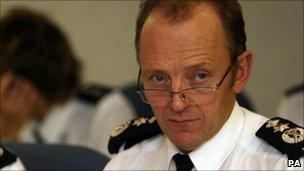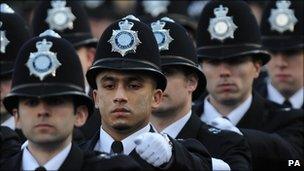Will cuts leave police fit for purpose?
- Published

Sir Hugh Orde: Former Northern Ireland chief constable
On the eve of massive public sector cuts, Sir Hugh Orde, president of the Association of Chief Police Officers (Acpo) sets out the challenges faced by forces up and down the country.
It's not easy being responsible for public money - but when you are spending to protect the public, then the job is as difficult as it can be.
That's the position that 43 chief constables in England and Wales are in as they prepare to see the red ink on the spreadsheets dispatched later this week from Whitehall.
Sir Hugh Orde, president of Acpo, and chief officers in headquarters across the UK have spent months trying to work out what the cuts will mean. One early estimate put the cuts at 60,000 jobs, other figures from individual forces talk of 40,000.
But the big question is what kind of police forces will emerge - and will they be fit for purpose?
"This goes back to hard choices," says Sir Hugh, the former chief constable of Northern Ireland. "They are going to be pretty tough. We are not in the business of salami slicing anymore. We are going to have to ask some really hard questions with the public: what is it that you want the police to stop doing?
"The point is something has to give. We are not in a position in my judgement to do a bit less of everything. But nobody can tell us what they want less of."
Visible and invisible threats
The policing cuts debate fundamentally comes down to a balancing act between visible and invisible work.
Half a century ago, more than a third of a constabulary's manpower was spent on those foot patrols - nabbing burglars with their swag bags.
Today there are forces that dedicate just 12% of constables to patrols because they have expanded forensic units, intelligence teams and largely invisible public protection work like child abuse, domestic violence and sexual offences.
But while officers have shifted from beat patrols to specialised units, police chiefs believe public perceptions remain stuck at Dixon of Dock Green.
But given the political and community pressure to protect the "front line", most chief constables are planning to cut specialist units, even though they argue they prove their worth. And many chiefs think the pressure to focus on local "visible" crime will grow if the government's pledge to create elected Police and Crime Commissioners goes through.
But surely that's the point of policing? Dealing with what matters to local people?
Yes and no, argue many chiefs. The drugs market, for example, does not start and end with the low-level street dealer who is a menace near you. In some cases the drugs are supplied to international gangs who steal and export luxury cars to order.
Your car can be in a container and on its way to Africa, to be exchanged for the drugs consignment to be sold down the road from you, before you realise it's gone.
"Communities are saying they want one or two more officers on the street, the chief is saying that he would love to give them that," says Sir Hugh. "But to deal with that level of sophistication of crime, he needs his local detectives, regional detectives, regional intelligence, national intelligence and a serious and organised crime agency."
And this is why chief constables worry about the balance of cuts, public perceptions and political pressure in the years ahead.
Beating the retreat?
Sir Hugh is among those chiefs riled by the suggestion, made by the chief inspector of constabulary,, external that police need to reclaim the streets in the battle over anti-social behaviour.
The Acpo president argues last week's Greater Manchester Police's 999 calls Twitter experiment sums up the conundrum for police over hoodies and incivility on British streets.
Over 24 hours, the force tweeted all the 999 calls it received. Many of the calls were "completely irrelevant" to policing, says Sir Hugh, even if they were of great concern to the people who made the call.
He says: "Where the pressure comes on is when you are facing a reducing budget. How much of that [anti-social behaviour] business can be just left to the police? If the cops don't turn up, there is not much chance of someone else helping out.
"I think it is utterly predictable that, as other partners have to step back, that the risk is that we collect more front-line response work because we are that unique 24-hour seven day a week service."
In other words, he is warning that if councils cut community services, police will pick up the pieces.
But if the pressure mounts on the police to do that work, what does it mean for resources that would otherwise be targeted at that international drugs-market car theft gang?
It's in that context that Sir Hugh says the "overwhelming majority" of chiefs want to talk about merging 43 forces into more regional units.
These chiefs believe mergers will save money and make it easier to target organised regional and cross-border criminality, including the major threats of cybercrime and extremism highlighted in the government's security review, external.
The problem is that mergers are not politically acceptable to government, are hard to sell to communities and don't sit easily with the plan for locally-elected commissioners.
"Chiefs are looking to protect all they can," says Sir Hugh. "They're doing much more collaboration across forces, flawed though that is, they are doing their level best against all the imponderables that throws up.

Front line protected? But at the cost of successful specialist units?
"There's no political will from any party to reform the basic building blocks of policing. It is realistic to expect some of the smaller forces may struggle hugely if it's a massive [spending] hit."
And it's this fear of struggling alone which is bringing the question of mergers back into view.
"It's a legitimate question to ask are we structured in the best way to deliver against threats that were not even imagined in 1962 [the last major police reform," says Sir Hugh.
"We have to find the least worst fit. Any boundary is a false boundary from a criminal's perspective. We have 43 boundaries and it's a legitimate question whether we think that's sensible in the current world. The political view is that they are not for tampering with and I respect that view but I think there may be a cost to it as we drive out efficiencies.
"If there was a wider debate about the complexity of the current world, you may see a greater willingness to move away from the importance of a cap badge to the importance of the best service we can delivery in a time of cut backs."
- Published10 September 2010
- Published15 July 2010
- Published10 September 2010